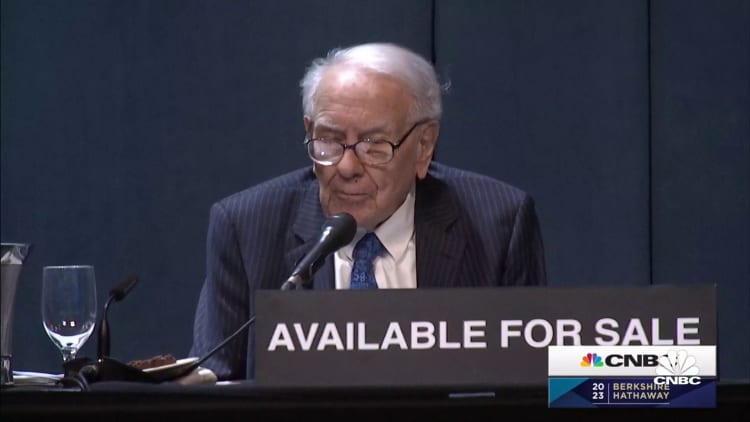Shari Redstone, president of National Amusements and controlling shareholder of Paramount Global, walks to a morning session at the Allen & Compan
Shari Redstone, president of National Amusements and controlling shareholder of Paramount Global, walks to a morning session at the Allen & Company Sun Valley Conference in Sun Valley, Idaho, July 12, 2023.
David A. Grogan | CNBC
Shari Redstone may have missed her window.
Paramount Global‘s controlling shareholder is open to a merger or selling the company at the right price, according to people familiar with her thinking. And she has been open to it for several years, said the people, who asked not to speak publicly because the discussions have been private.
Spokespeople for Redstone and Paramount Global declined to comment.
The problem has been finding the right deal for shareholders. Market conditions have made a transformative transaction difficult at best and highly unlikely at worst.
“The market is crying out for reshaping media company portfolios and consolidation,” said Jon Miller, chief executive at Integrated Media and a senior advisor at venture firm Advancit Capital, which Redstone co-founded. “But the deck is stacked against large-scale transactions now because of both immediate concerns in terms of ad sales, subscription video numbers and the cost of debt. No one wants to transact at the current market valuations that these companies are given.”
Paramount Global is an archetype for the media industry’s consolidation conundrum. The company consists of Paramount Pictures, the CBS broadcast network, 28 owned-and-operated local CBS stations, the streaming service Paramount+, free advertising-supported Pluto TV, “Star Trek,” “SpongeBob SquarePants,” MTV, Nickelodeon, Comedy Central, BET and Showtime. It also owns the physical Paramount studio lot in Los Angeles, California.
From a sum-of-the-parts perspective, the company holds a strong hand. Many of Paramount Global’s assets would fit nicely within larger media companies.
“Paramount has a tremendous amount of assets in its content library and they own some pretty powerful sports rights in the form of the NFL contract, Champions League soccer and March Madness,” Guggenheim analyst Michael Morris told CNBC last week.
“But, they are still losing money on their streaming service,” Morris said. “They need to pull these things together, right-size the content, super charge that topline through pricing and penetration, and then we can see investors get excited about this idea again.”
Declining revenue from the acceleration of pay-TV cord-cutting, continued streaming losses and rising interest rates have put Redstone in a bind. The company’s market capitalization has slumped to $7.7 billion, nearly the company’s lowest valuation since Redstone merged CBS and Viacom in 2019. At the time, that transaction gave the combined company a market valuation of about $30 billion.
It’s unclear whether staying the course will help turn investor sentiment. Warren Buffett, CEO of Berkshire Hathaway, one of Paramount Global’s biggest shareholders, told CNBC in April that streaming “is not really a very good business.” He also noted that shareholders in entertainment companies “really haven’t done that great over time.”

Paramount Global’s direct-to-consumer businesses lost $424 million in the second quarter and $511 million in the first quarter. The company reports third-quarter earnings Nov. 2.
CEO Bob Bakish said 2023 will be the peak loss year for streaming. Paramount Global cut its dividend to 5 cents per share from 24 cents per share to “further enhance our ability to deliver long-term value for our shareholders as we move toward streaming profitability,” Bakish said in May.
Wells Fargo analyst Steven Cahall suggested earlier this year that Bakish should shut down the company’s streaming business entirely, despite the fact that Paramount+ has accumulated more than 60 million subscribers.
“We believe Paramount Global is worth a lot more either as a content arms dealer or as a break-up for sale story,” Cahall wrote in a note to clients in May. “Great content, misguided strategy.”
Big Tech lifeline
Bob Bakish, CEO of Paramount, speaks with CNBC’s David Faber on Sept. 6, 2023.
CNBC
Executives at Paramount Global continue to hold out hope that a large technology company, such as Apple, Amazon or Alphabet, will view the collection of assets as a way to bolster their content aspirations, according to people familiar with the matter.
Paramount+’s 61 million subscribers could help supersize an existing streaming service such as Apple TV+ or Amazon’s Prime Video, or give Alphabet’s YouTube a bigger foothold into subscription streaming beyond the National Football League’s Sunday Ticket and YouTube TV.
While Federal Trade Commission Chairman Lina Khan has been particularly focused on limiting the power of Big Tech companies, Apple, Amazon and Alphabet may actually be better buyers than legacy media companies from a regulatory standpoint. They don’t own a broadcast TV network, unlike Comcast (NBC), Fox or Disney (ABC). It’s highly unlikely U.S. regulators would allow one company to own two broadcast networks. Divesting CBS is possible, but it’s so intertwined with Paramount+ that separating the network from the streaming service would be messy.
“We believe Paramount Global is too small to win the streaming wars, but it is bite-size enough to be acquired by a larger streaming competitor for its deep library of film and TV content, as well as its sports rights and news assets,” Laura Martin, an analyst at Needham & Co., wrote in an Oct. 9 research note to clients.
Acquiring Paramount Global would be a relative drop in the bucket for a Big Tech company. Paramount Global’s market value was below $8 billion as of Friday. It also has about $16 billion in long-term debt.
Still, even with huge balance sheets and trillion-dollar valuations, there’s no evidence technology companies want to own declining legacy media assets such as cable and broadcast networks. Netflix has built its business specifically on the premise that these assets will ultimately die. Paramount’s lot and studio may be appealing for content creation and library programming, but that would leave Redstone holding a less desirable basket of legacy media assets.
Breakup difficulties
It’s possible Redstone could break up the company and sell off legacy media assets to a private equity firm that could milk them for cash. But Paramount Global’s diminished market valuation, relative to its debt, likely makes a leveraged buyout less appealing for a potential private equity firm.
Moreover, rising interest rates have generally slowed down take-private deals in all industries, as the cost of paying debt interest has soared. Globally, buyout fund deal volume in the first half of 2023 is down 58% from the same period a year ago, according to a Bain & Co. study.
If a full sale to Big Tech and a partial sale to private equity won’t happen, another option for Redstone is to merge or sell to another legacy media company. Warner Bros. Discovery could merge with Paramount Global, though putting together Warner Bros. and Paramount Pictures may hold up deal approval with U.S. regulators.
Beyond regulatory issues, recent history suggests big media mergers haven’t worked well for shareholders. Tens of billions of dollars in shareholder value have been lost in recent media mergers, including WarnerMedia and Discovery, Disney and the majority of Fox, Comcast/NBCUniversal and Sky, Viacom and CBS, and Scripps and Discovery.
Merger partners such as Warner Bros. Discovery also may prefer to sell or merge with a different company, such as Comcast’s NBCUniversal, if regulators allow a big media combination.
Redstone has recently dabbled around the edges, shedding some assets, such as book publisher Simon & Schuster, and engaging in talks to sell a majority stake in cable network BET.
But Paramount Global shelved the idea of selling a stake in BET in August after deciding sale offers were too low to outweigh the value of keeping the network in its cable network portfolio. With the total company’s market valuation below $8 billion, it’s difficult to convince buyers to pay big prices for parts. A change in broader investment sentiment that pushes the company’s valuation higher may help Redstone and other Paramount Global executives get more comfortable with divesting assets.
Selling National Amusements
If Redstone can’t find a deal to her liking, she could also sell National Amusements, the holding company founded by her father, Sumner Redstone, that owns the bulk of the company’s voting shares. National Amusements owns 77.3% of Paramount Global’s Class A (voting) common stock and 5.2% of the Class B common stock, constituting about 10% of the overall equity of the company.
Redstone took a $125 million strategic investment from merchant bank BDT & MSD Partners earlier this year to pay down debt, reiterating her belief in Paramount Global’s inherent value.
“Paramount has the best assets in the media industry, with an incredible content library and IP spanning all genres and demographics, as well as the No. 1 broadcast network, the leading free ad-supported streaming television service and the fastest-growing pay streaming platform in the U.S.,” Redstone said in a statement in May. “NAI has conviction in Paramount’s strategy and execution, and we remain committed to supporting Paramount as it takes the necessary steps to build on its success and capitalize on the strategic opportunities in our industry.”
Selling National Amusements wouldn’t alter Paramount Global’s long-term future. But it is a way out for Redstone if she can’t find a deal beneficial to shareholders.
Paramount Global isn’t actively working with an investment bank on a sale, according to people familiar with the matter. The company is content to wait for a shift in market conditions or regulatory officials before getting more aggressive on a transformational deal, said the people.
Still, Redstone’s predicament aptly sums up legacy media’s current problems. The industry is counting on a turn in market sentiment, while executives privately grumble that in the near term there’s little they can do about it.
WATCH: Mad Money host Jim Cramer weighs in on Paramount Global

Disclosure: Comcast’s NBCUniversal is the parent company of CNBC.
www.cnbc.com

COMMENTS